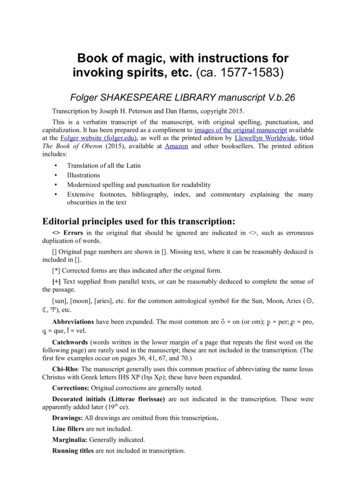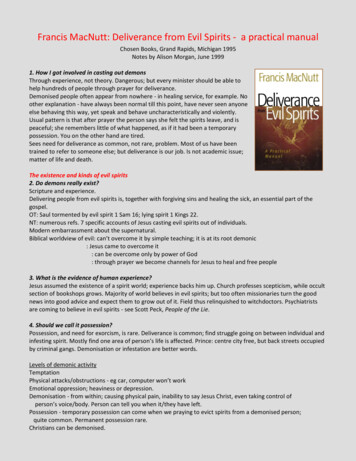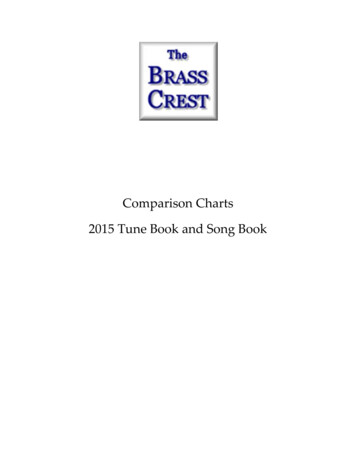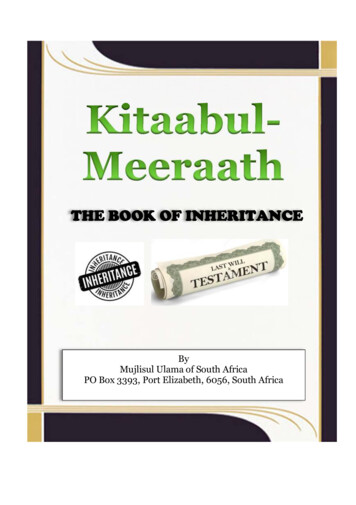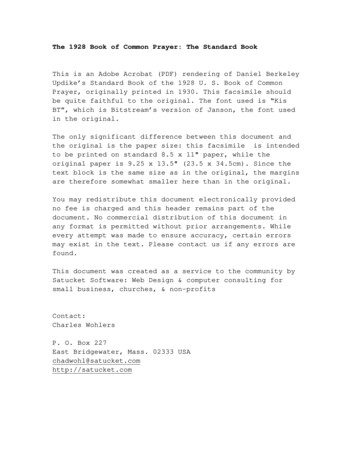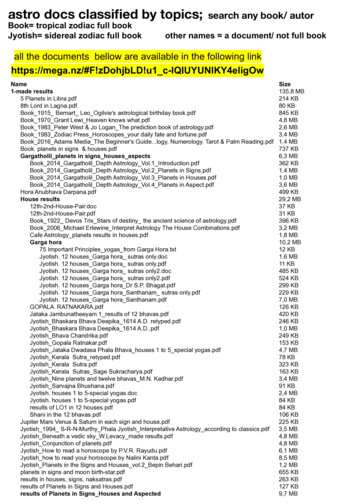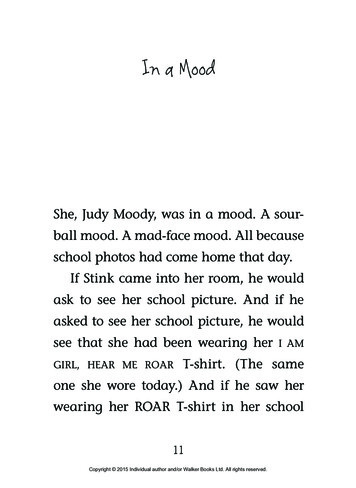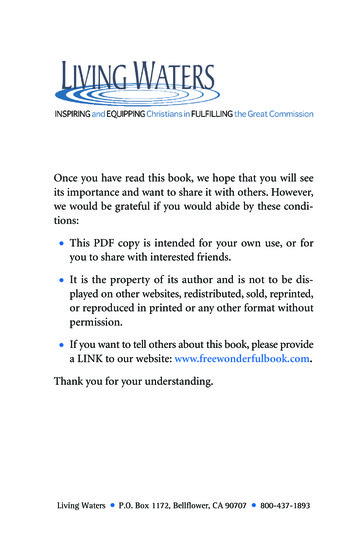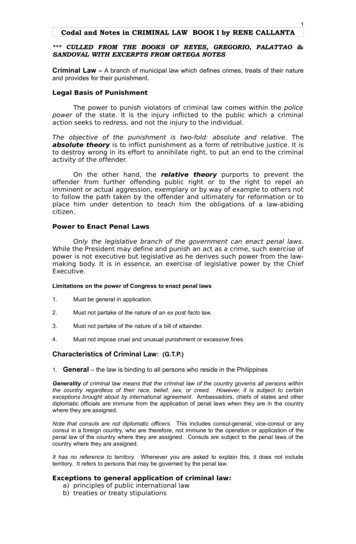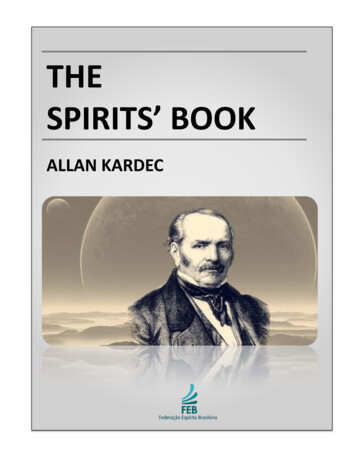
Transcription
THESPIRITS’ BOOKALLAN KARDEC
SPIRITUALIST PHILOSOPHYEdição especlalmente cedida peloNúcleo Espírita Caminheiros do BemDepartameato Editorial:LAKE - Livraria ALLAN KARDEC EditoraRua Monsenhor Anacleto, 199 - BrásFones: 229-0935, 229-0526 e 229-1227CEP 03003 - Cx. Postal 15.190São Paulo - Brasil
Spiritualist PhilosophyTHE SPIRITS’ BOOKCONTAININGTHE PRINCIPLES OF SPIRITIST DOCTRINEONTHE IMMORTALITY OF THE SOUL: THE NATURE OF SPIRITSAND THEIR RELATIONS WITH MEN; THE MORAL LAW:THE PRESENT LIFE, THE FUTURE LIFE, ANDTHE DESTINY OF THE HUMAN RACE.ACCORDING TO THE TEACHINGS OF SPIRITS OF HIGH DEGREE,TRANSMITTED THROUGH VARIOUS MEDIUMS,COLLECTED AND SEI' IN ORDERBYALLAN KARDECTranslated from the Hundred and Twentieth ThousandBYANNA BLACKWELLFEDERAÇÃO ESPÍRITA BRASILEIRADEPARTAMENTO EDITORIALRua Souza Valente, 1720941- 040 - Rio - RJ - BrasileAv. L-2 Norte - 0.603 - Conjunto F70830-030 - Brasília - DF - Brasil
ISBN 85-7328-022-06ª edição (2ª ed. FEB)Do 29 ao 33 milheiroCapa de CECCONI531-BB; 000.5-O; 2/1996FEDERAÇÃO ESPÍRITA BRASILEIRA(Casa-Máter do Espiritismo)Av. L-2 Norte - Q. 603 - Conjunto F70830-030 - Brasília-DF - BrasilReprodução fotomecânica e impressão offset dasOficinas do Departamento Gráfico da FEBRua Souza Valente, 1720941-040 - Rio, RJ - BrasilC.G.C. n 33.644.857/0002-84 I.E. n 81.600.503Impresso no BrasilPRESITA EN BRAZILOPedidos de livros à FEB - DepartamentoEditorial, via Correio ou, em grandes encomendas,via rodoviário: por carta, telefone (021) 589-6020,ou FAX (021) 589-6838.
TOTHE DEVOTED WIFEOFALLAN KARDECTHIS TRANSLATIONISAFFECTIONALITY INSCRIBED.
9TRANSLATOR'S PREFACEIN presenting to her countrymen a work which has long since obtained a wide acceptance onthe Continent, the translator has thought that a brief notice of its author, and of thecircumstances under which it was produced, might not be without interest for English readers.Léon-Dénizarth-Hippolyte Rivail, better known by his nom de plume of ALLAN KARDEC,was born at Lyons, on the 4th of October 1804, of an old family of Bourg-en-Bresse, that hadbeen for many generations honourably distinguished in the magistracy and at the bar. Hisfather, like his grandfather, was a barrister of good standing and high character; his mother,remarkably beautiful, accomplished, elegant, and amiable, was the object, on his part, of aprofound and worshipping affection, maintained unchanged throughout the whole of his life.Educated at the Institution of Pestalozzi, at Yverdun (Canton de Vaud), he acquired at anearly age the habit of investigation and the freedom of thought of which his later life wasdestined to furnish so striking an example. Endowed by nature with a passion for teaching, hedevoted himself, from the age of fourteen, to aiding the studies of those of his schoolfellowswho were less advanced than himself; while such was his fondness for botany, that he oftenspent an entire day among the mountains, walking twenty or thirty miles, with a wallet on hisback, in search of specimens for his herbarium. Born in a Catholic country, but educated in aProtestant one, he began, while yet a mere boy, to meditate on the means of bringing about aunity of belief among the various Christian sects-a project of religious reform at which lielaboured in silence for many years, but necessarily without success, the elements of thedesired solution not being at that time in his possession.Having finished his studies at Yverdun, he returned to Lyons in 24, with the intention ofdevoting himself to the law; but
10ALLAN KARDECvarious acts of religious intolerance to which he unexpectedly found himself subjected ledhim to renounce the idea of fitting himself for the bar, and to take up his abode in Paris,where he occupied himself for some time in translating Telemachus and other standardFrench books for youth into German. Having at length determined upon his career, hepurchased, in 1828, a large and flourishing educational establishment for boys, and devotedhimself to the work of teaching, for which, by his tastes and acquirements, he was peculiarlyfitted. In 1830 he hired, at his own expense, a large hall in the Rue de Sèvres, and openedtherein courses of gratuitous lectures on Chemistry, Physics, Comparative Anatomy, andAstronomy. These lectures, continued by him through a period of ten years, were highlysuccessful, being attended by an auditory of over five hundred persons of every rank ofsociety, many of whom have since attained to eminence in the scientific world.Always desirous to render instruction attractive as well as profitable, he invented aningenious method of computation, and constructed a mnemotechnic table of French history,for assisting students to remember the remarkable events and discoveries of each reign.Of the numerous educational works published by him may be mentioned, A Plan for the'Improvement of Public Instruction. submitted by him in 1828 to the French LegislativeChamber, by which body it was highly extolled, though not acted upon; A Course of Practicaland Theoretic Arithmetic, on the Pestalozzian System, for the' use of Teachers and Mothers(1829); A Classical Grammar of the French Tongue (1831); A Manual for the use ofCandidates for Examination in the Public Schools; with Explanatory Solutions of variousProblems of Arithmetic and Geometry (1848); Normal Dictations for the Examinations of theHotel de Ville and the Sorbonne, with Special Dictations on Orthographic Difficulties (1849)These works, highly esteemed at the time of their publication, are still in use in many Frenchschools; and their author was bringing out new editions of some of them at the time of hisdeath.He was a member of several learned societies; among others, of the Royal Society of Arras,which, in 1831, awarded to him the Prize of Honour for a remarkable essay on the question,"What is the System of Study most in Harmony with the Needs of the Epoch?" He was forseveral years Secretary to the
11THE SPIRITS’ BOOKPhrenological Society of Paris, and took an active part in the labours of the Society ofMagnetism, giving much time to the practical investigation of somnambulism, trance,clairvoyance, and the various other phenomena connected with the mesmeric action. Thisbrief outline of his labours will suffice to show his mental activity, the variety of hisknowledge, the eminently practical turn of his mind, and his constant endeavour to be usefulto his fellow-men.When, about 1850, the phenomenon of "table-turning" was exciting the attention of Europeand ushering in the other phenomena since known as "spiritist", he quickly divined the realnature of those phenomena, as evidence of the existence of an order of relationships hithertosuspected rather than known-viz., those which unite the visible and invisible worlds.Foreseeing the vast importance, to science and to religion, of such an extension of the field ofhuman observation, he entered at once upon a careful investigation of the new phenomena. Afriend of his had two daughters who had become what are now called "mediums." They weregay, lively, amiable girls, fond of society, dancing, and amusement, and habitually received,when "sitting" by themselves or with their young companions, "communications" in harmonywith their worldly and somewhat frivolous disposition. But, to the surprise of all concerned, itwas found that, whenever he was present, the messages transmitted through these youngladies were of a very grave and serious character; and on his inquiring of the invisibleintelligences as to the cause of this change, he was told that "spirits of a much higher orderthan those who habitually communicated through the two young mediums came expressly forhim, and would continue to do so, in order to enable him to fulfil an important religiousmission."Much astonished at so unlooked-for an announcement, he at once proceeded to test itstruthfulness by drawing up a series of progressive questions in relation to the variousproblems of human life and the universe in which we find ourselves, and submitted them tohis unseen interlocutors, receiving their answers to the same through the instrumentality ofthe two young mediums, who willingly consented to devote a couple of evenings every weekto this purpose, and who thus obtained, through table-rapping and planchette-writing, thereplies which have become the basis of the spiritist theory, and which they were as littlecapable of appreciating as of inventing.
12ALLAN KARDECWhen these conversations had been going on for nearly two years, he one day remarked to hiswife, in reference to the unfolding of these views, which she had followed with intelligentsympathy: "It is a most curious thing! My conversations with the invisible intelligences havecompletely revolutionised my ideas and convictions. The instructions thus transmittedconstitute an entirely new theory of human life, duty, and destiny, that appears to me to beperfectly rational and coherent, admirably lucid and consoling, and intensely interesting. Ihave a great mind to publish these conversations in a book; for it seems to me that whatinterests me so deeply might very likely prove interesting to others." His wife warmlyapproving the idea, he next submitted it to his unseen interlocutors, who replied in the usualway, that it was they who had suggested it to his mind, that their communications had beenmade to him, not for himself alone, but for the express purpose of being given to the world ashe proposed to do, and that the time had now come for putting this plan into execution. "Tothe book in which you will embody our instructions," continued the communicatingintelligences, "you will give, as being our work rather than yours, the title of Le Livre desEsprits (THE SPIRITS’ BOOK); and you will publish it, not under your own name, but underthe pseudonym of ALLAN KARDEC.¹ Keep your own name of Rivail for your own booksalready published; but take and keep the name we have now given you for the book you areabout to publish by our order, and, in general, for all the work that you will have to do in thefulfilment of the mission which, as we have already told you, has been confided to you byProvidence, and which will gradually open before you as you proceed in it under ourguidance."The book thus produced and published sold with great rapidity, making converts not inFrance only, but all over the Continent, and rendering the name of ALLAN KARDEC "ahousehold word" with the readers who knew him only in connection with it; so that he wasthenceforth called only by that name, excepting by his old personal friends, with whom bothhe and his wife always retained their family-name. Soon after its publication, he founded TheParisian Society of Psychologic Studies, of which he was President until his death, and whichmet every Friday evening at his house, for the purpose of obtaining from spirits, throughwriting mediums, instructions in elucidation of truth and duty.¹An old Briton name in his mother's family.
13THE SPIRITS’ BOOKHe also founded and edited until he died a monthly magazine, entitled La Revue Spirite,Journal of Psychologic Studies, devoted to the advocacy of the views set forth in The Spirit'sBook.Similar associations were speedily formed all over the world. Many of these publishedperiodicals of more or less importance in support of the new doctrine; and all of themtransmitted to the Parisian Society the most remarkable of the spirit-communications receivedby them. An enormous mass of spirit-teaching, unique both in quantity and in the variety ofthe sources from which it was obtained, thus found its way into the hands of ALLANKARDEC by whom it was studied, collated, co-ordinated, with unwearied zeal and devotion,during a period of fifteen years. From the materials thus furnished to him from every quarterof the globe he enlarged and completed THE SPIRITS’ BOOK, under the direction of thespirits by whom it was originally dictated; the "Revised Edition" of which work, brought outby him in 1857 (vide "Preface to the Revised Edition," p. 19) has become the recognised textbook of the school of Spiritualist Philosophy so intimately associated with his name. Fromthe same materials he subsequently compiled four other works, viz., The Mediums' Book (apractical treatise on Medianimity and Evocations), 1861; The Gospel as Explained by Spirits(an exposition of morality from the spiritist point of view), 1864; Heaven and Hell (avindication of the justice of the divine government of the human race), 1865; and Genesis(showing the concordance of the spiritist theory with the discoveries of modern science andwith the general tenor of the Mosaic record as explained by spirits), 1867. He also publishedtwo short treatises, entitled What is Spiritism? and Spiritism Reduced to its SimplestExpression.It is to be remarked, in connection with the works just enumerated, that ALLAN KARDECwas not a "medium," and was consequently obliged to avail himself of the medianimity ofothers in obtaining the spirit-communications from which they were evolved. The theory oflife and duty, so immediately connected with his name and labours that it is often erroneouslysupposed to have been the product of his single mind or of the spirits in immediateconnection with him, is therefore far less the expression of a personal or individual opinionthan are any other of the spiritualistic theories hitherto propounded; for the basis of religiousphilosophy laid down in his works was not, in any way, the production of his ownintelligence, but was as new to him as to
14ALLAN KARDECany of his readers, having been progressively educed by him from the concurrent statementsof a legion of spirits, through many thousands of mediums, unknown to each other, belongingto different countries, and to every variety of social position.In person, ALLAN KARDEC was somewhat under middle height. Strongly built, with alarge, round, massive head, well-marked features, and clear grey eyes, he looked more like aGerman than a Frenchman. Energetic and persevering, but of a temperament that was calm,cautious, and unimaginative almost to coldness, incredulous by nature and by education, aclose, logical reasoner, and eminently practical in thought and deed, he was equally free frommysticism and from enthusiasm. Devoid of ambition, indifferent to luxury and display, themodest income he had acquired from teaching and from the sale of his educational workssufficed for the simple style of living he had adopted, and allowed him to devote the whole ofthe profits arising from the sale of his spiritist books and from the Revue Spirite to thepropagation of the movement initiated by him. His excellent wife relieved him of all domesticand worldly cares, and thus enabled him to consecrate himself entirely to the work to whichhe believed himself to have been called, and which he prosecuted with unswerving devotion,to the exclusion of all extraneous occupations, interests, and companionships, from the timewhen he first entered upon it until he died. He made no visits beyond a small circle ofintimate friends, and very rarely absented himself from Paris, passing his winters in the heartof the town, in the rooms where be published his Revue, and his summers at the Villa Ségur,a little semi-rural retreat which he had built and planted, as the home of his old age and thatof his wife, in the suburban region behind the Champ de Mars, now crossed in every directionby broad avenues and being rapidly built over, but which at that time was a sort of waste landthat might still pass for "the country."Grave, slow of speech, unassuming in manner, yet not without a certain quiet dignityresulting from the earnestness and single-mindedness which were the distinguishing traits ofhis character, neither courting nor avoiding discussion, but never volunteering any remarkupon the subject to which he had devoted his life, he received with affability the innumerablevisitors from every part of the world who came to converse with him in regard to the views ofwhich he was the recognised exponent, answering questions and objections, explainingdifficulties, and giving in-
15THE SPIRITS’ BOOKformation to all serious inquirers, with whom he talked with freedom and animation, his faceoccasionally lighting up with a genial and pleasant smile, though such was his habitualsobriety of demeanour that he was never known to laugh.Among the thousands by whom he was thus visited were many of high rank in the social,literary, artistic, and scientific worlds. The Emperor Napoleon III., the fact of whose interestin spiritist-phenomena was no mystery, sent for him several times, and held longconversations with him at the Tuileries upon the doctrines of THE SPIRITS’ BOOK.Having suffered for many years from heart-disease, ALLAN KARDEC drew up, in 1869, theplan of a new spiritist organisation, that should carry on the work of propagandism after hisdeath. In order to assure its existence, by giving to it a legal and commercial status, hedetermined to make it a regularly constituted joint-stock limited liability publishing andbookselling company, to be constituted for a period of ninety-nine years, with power to buyand sell, to issue stock, to receive donations and bequests, etc. To this society, which was tobe called "The Joint Stock Company for the Continuation of the Works of ALLANKARDEC," he intended to bequeath the copyright of his spiritist writings and of the RevueSpirite.But ALLAN KARDEC was not destined to witness the realisation of the project in which hetook so deep an interest, and which has since been carried out with entire exactitude by hiswidow.On the 31st of March 1869, having just finished drawing up the constitution and rules of thesociety that was to take the place from which he foresaw that he would soon be removed, hewas seated in his usual chair at his study-table, in his rooms in the Rue Sainte Anne, in the actof tying up a bundle of papers, when his busy life was suddenly brought to an end by therupture of the aneurysm from which he had so long suffered. His passage from the earth tothe spirit-world, with which he had so closely identified himself, was instantaneous, painless,without a sigh or a tremor; a most peaceful falling asleep and reawaking-fit ending of such alife.His remains were interred in the cemetery of Montmartre, in presence of a great concourse offriends, many hundreds of whom assemble there every year, on the anniversary of hisdecease, when a few commemorative words are spoken, and fresh
16ALLAN KARDECflowers and wreaths, as is usual in Continental graveyards, are laid upon his tomb.It is impossible to ascertain with any exactness the number of those who have adopted theviews set forth by ALLAN KARDEC; estimated by themselves at many millions, they areincontestably very numerous. The periodicals devoted to the advocacy of these views invarious countries already number over forty, and new ones are constantly appearing. Thedeath of ALLAN KARDEC has not slackened the acceptance of the views set forth by him,and which are believed by those who hold them to be the basis, but the basis only, of the newdevelopment of religious truth predicted by Christ; the beginning of the promised revelationof "many things" that have been "kept hidden since the foundation of the world," and for theknowledge of which the human race was "not ready" at the time of that prediction.In executing, with scrupulous fidelity, the task confided to her by ALLAN KARDEC, thetranslator has followed, in all quotations from the New Testament, the version by Le Maistrede Sacy, the one always used by ALLAN KARDEC.ANNA BLACKWELL
THE SPIRITS’ BOOK
19PREFACE TO THE REVISED EDITIONIN the first edition of this work, we announced our intention to publish a Supplement treatingof points for which it had been impossible to find room in that edition, or which might besuggested by subsequent investigations ; but the new matter proved to be so closelyconnected with what had been previously published as to render its publication in a separatevolume inexpedient. We therefore preferred to await the reprinting of the work, takingadvantage of the opportunity thus afforded to fuse the whole of the materials together, tosupress redundancies, and to make a more methodical arrangement of its contents. This newedition may consequently be considered as a new work, although the principles originally laiddown have undergone no change, excepting in a very few instances which will be found toconstitute complements and explanations rather than modifications.This conformity of the teachings transmitted, notwithstanding the diversity of the sourcesfrom which they have emanated, is a fact of great importance in relation to the establishmentof spiritist doctrine. Our correspondence shows us, moreover, that communications, identical(in substance, if not in form) with those embodied in the present work, have been obtained invarious quarters, and even, in some instances, previously to the publication of THE SPIRITS’BOOK, which has served to systematise and to confirm them. History, on the other hand,proves that most of the ideas herein set forth have been held by the most eminent thinkers ofancient and of modern times, and thus gives to them the additional sanction of its testimony.ALLAN KARDEC
21INTRODUCTIONIFOR new ideas new words are needed, in order to secure clearness of language by avoidingthe confusion inseparable from the employment of the same term for expressing differentmeanings. The words spiritual, spiritualist, spiritualism, have a definite acceptation; to givethem a new one, in order to apply them to the doctrine set forth by spirits, would be tomultiply the causes of amphibology, already so numerous. Strictly speaking, Spiritualism isthe opposite of Materialism; every one is a Spiritualist who believes that there is in himsomething more than matter, but it does not follow that he believes in the existence of spirits,or in their communication with the visible world. Instead, therefore, of the wordsSPIRITUAL SPIRITUALISM, we employ, to designate this latter belief, the wordsSPIRITIST, SPIRITISM, which, by their form, indicate their origin and radical meaning, andhave thus the advantage of being perfectly intelligible; and we reserve the words spiritualism,spiritualist, for the expression of the meaning attached to them by common acceptation. Wesay, then, that the fundamental principle of the spiritist theory, or Spiritism, is the relation ofthe material world with spirits, or the beings of the invisible world ; and we designate theadherents of the spiritist theory as spiritists.In a special sense, "THE SPIRITS’ BOOK" contains the doctrine or theory of spiritism; in ageneral sense, it appertains to the spiritualist school, of which it presents one of the phases. Itis for this reason that we have inscribed the words Spiritualist Philosophy on its title-page.IIThere is another word of which it is equally necessary to define the meaning, because it is thekeystone of every system of morality, and also because, owing to the lack of a precisedefinition,
22ALLAN KARDECit has been made the subject of innumerable controversies; we refer to the word soul. Thedivergence of opinion concerning the nature of the soul is a result of the variety of meaningsattached to this word. A perfect language, in which every idea had its own special term,would save a vast deal of discussion; for, in that case, misunderstanding would be impossible.Some writers define the soul as being the principle of organic life, having no existence of itsown, and ceasing with the life of the body. According to this purely Materialistic belief, thesoul is an effect, and not a cause.Others consider the soul as being the principle of intelligence, the universal agent, of whicheach being absorbs a portion. According to them, there is, in the entire universe, only onesoul, which distributes sparks of itself among all intelligent beings during their life ; eachspark, after the death of the being it has animated, returning to the common source, andblending again with the general whole, as brooks and rivers return to the ocean from whichthey were produced. This opinion differs from the preceding one, inasmuch as, according tothe latter hypothesis, there is in us something more than matter, something that remains inexistence after our death; but, practically, it is much as though nothing remained of us, since,no longer possessing individuality, we should retain no consciousness of our identity.According to this hypothesis, the universal soul is God, and each being is a portion of theDivinity. It is a species of Pantheism.According to others, again, the soul is a moral being, distinct, independent of matter, andpreserving its individuality after death. This acceptation of the word soul is certainly the onemost generally received; because, under one name or another, the idea of a being that survivesthe body is found as an instinctive belief, and independently of all teaching, among allnations, whatever their degree of civilisation. This doctrine, according to which the soul is acause and not an effect, is that of the spiritualists.Without discussing the value of these opinions, and considering the subject merely under itsphilological aspect, we say that these three applications of the word soul constitute threedistinct ideas, each of which demands a different term. "Soul" has, therefore, a triplemeaning, and is employed by each school according to the special meaning it attributes to thatword. In order to avoid
23THE SPIRITS’ BOOKthe confusion naturally resulting from the use of the same word to express three differentideas, it would he necessary to confine the word to one of these three ideas; it would notmatter to which, provided the choice were clearly understood. We think it more natural totake it in its most common acceptation; and for this reason we employ the word SOUL toindicate the immaterial and individual being which resides in us, and survives the body. Evenif this being did not really exist, and were only a product of the imagination, a specific termwould still be needed to designate it.For want of such a term for each of the other ideas now loosely understood by the word soul,we employ the term vital principle to designate the material and organic life which, whatevermay be its source, is common to all living creatures, from the plant to man. As life can existwithout the thinking faculty, the vital principle is something distinct from independent of it.The word vitality would not express the same idea. According to some, the vital principle is aproperty of matter; an effect produced wherever matter is found under certain givenconditions; while, in the opinion of the greater number of thinkers, it resides in a specialfluid, universally diffused, and of which each being absorbs and assimilates a portion duringlife, as inert bodies absorb light; the vital principle being identical with the vital fluid, whichis generally regarded as being the same as the animalised electric fluid, designated also as themagnetic fluid, the nervous fluid, etc.However this may be, one fact is certain, for it is proved by observation, viz., that organicbeings possess in themselves a force which, so long as it exists, produces the phenomena oflife ; that physical life is common to all organic beings, and is independent of intelligence andthought; that intelligence and thought are faculties peculiar to certain organic species; and,lastly, that, among the organic species endowed with intelligence and thought, there is onewhich is endowed with a special moral sense that gives it an incontestable superiority overthe others, viz., human species.It is evident that, being employed according to various acceptations, the term soul does notexclude either Materialism or Pantheism. Spiritualists themselves understand the term soulaccording to one or other of the first two definitions, without denying the distinct immaterialbeing, to which, in that case it would give some other name. This word, therefore, is not the
24ALLAN KARDECrepresentative of an opinion; it is a Protean term, defined by each after his own fashion, andthus giving rise to interminable disputes.We might also avoid confusion, even while employing the word soul in the three sensesdefined above, by adding to it some qualifying term that should specify the point of viewfrom which we consider it, or the mode in which we apply it. It would be, in that case, ageneric word, representing at once the principles of material life, of intelligence, and of themoral faculty, each of which would be distinguished by an attribute, as is done, for example,with the word gas, by adding the words hydrogen, oxygen, etc. Thus we might say-and itwould, perhaps, be the best plan to adopt-vital soul for the principle of material life,intellectual soul for the principle of intelligence, and spiritual soul for the principle of ourindividuality after death ; in which case the vital soul would be common to all organic beings,plants, animals, and men ; the intellectual soul would be the peculiar property of animals andmen ; and the spiritual soul would belong to men only.We have thought it all the more important to be explicit in regard to this point, because thespiritist theory is naturally based on the existence in us of a being independent of matter, andthat survives the body. As the word soul will frequently recur in the course of this work, itwas necessary to define the meaning we attach to it, in order to avoid all misunderstanding.We now come to the principal object of this preliminary explanation.IIISpiritist doctrine, like all new theories, has its Supporters and its opponents. We willendeavour to reply to some of the objections of the latter, by examining the worth of thereasons on which they are based, without, however, pretending to be able to convinceeverybody, but add
French books for youth into German. Having at length determined upon his career, he purchased, in 1828, a large and flourishing educational establishment for boys, and devoted himself to the work of teaching, for which, by his tastes and acquirements, he was peculiarly fitted. In 1830 he
